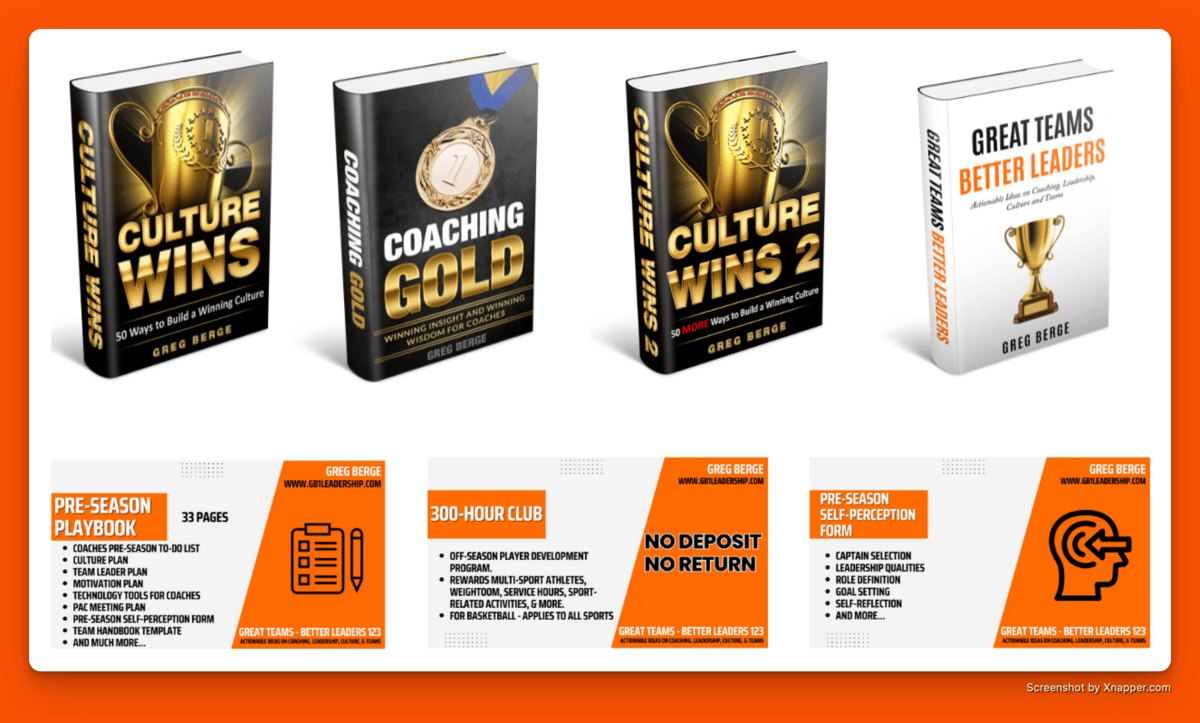Good morning! A warm welcome to the 116 new subscribers who joined this week. We are happy to have you on board!
Here's what's coming:
5 Regrets for Athletes to Avoid 🏆
Some Lombardi GOLD 🥇
Tim Kight on Coachability 📋
Read Time ~ 4 minutes.
Let's dive in
Our Sponsors help make this newsletter FREE for our 5700+ Subscribers!

“Welp, I have my season themes picked out for my next 50 years of coaching! I love how Coach Berge breaks down the culture lessons into very bite-sized, related stories that are easy to implement with any sports team.” - Matt Hackenberg
Find Digital Books, BUNDLE DEALS, FREE Resources & More at gberge.gumroad.com. Find Paperback versions on Amazon HERE.
💭 ONE THOUGHT
The Pain of Discipline or the Pain of Regret? The Ultimate Choice.
Life is a journey filled with choices, challenges, and triumphs.
Along the way, we encounter two distinct types of pain:
The pain of discipline
The pain of regret
These two pains often stand at opposite ends of the spectrum, and our choices determine which path we ultimately embrace.
When it comes to the realm of athletics, these pains become even more pronounced.
Athletes understand the value of discipline, commitment, and hard work. They also understand that succumbing to regret can be a heavy burden.
Here are five regrets that athletes should avoid.
1. Not Putting in the Time
Commitment is hard.
One of the most common regrets athletes face is not investing the time and effort needed to succeed.
Success in sports requires dedication, practice, and perseverance. Athletes who fail to commit themselves often fall short of their goals.
Whether skipping training sessions or not giving their best during practice, the regret of not giving enough time can haunt them.
We see it often as coaches.
A young basketball player with incredible natural talent who neglects to develop their skills through consistent practice.
As they grow older, they realize that their peers who devoted countless hours to training have surpassed them. The pain of regret gnaws at them, reminding them of the missed opportunities.
Bill Russell said it best.
2. Thinking the Grass is Greener Elsewhere:
Athletes, like anyone else, can fall prey to the belief that the grass is greener on the other side.
It's easy to become envious of teammates on other teams, thinking they have better opportunities or resources.
However, this mindset often leads to regret and hinders an athlete's ability to focus on their own growth.
Consider the soccer player who becomes disenchanted with their current team due to a lack of playing time.
They start contemplating joining another team, assuming it will solve all their problems. However, they risk regretting their decision by jumping ship without addressing the real issue.
Always remember…
The grass is always greenest where you water it the most!
3. Not Buying into the Team
Team sports require a We > Me mindset.
Athletes who fail to buy into the team concept often regret their inability to connect with teammates and contribute fully to team success.
Take the example of a volleyball player prioritizing personal glory over the team's objectives.
They consistently play for their own statistics rather than focusing on what the team needs to win.
When the season ends, they may realize that their individual accomplishments are pale compared to the fulfillment that comes from being part of a true team.
Coach Sean McVay talks about the power of We > Me here.
4. Not Accepting their Role
Each player has a specific role to play. They are all important. And accepting that role is crucial for TEAM success.
Athletes who resist or reject their role often experience regret, as they may limit their own growth and hurt the team's success.
Imagine a hockey player who aspires to be the team's leading scorer but is assigned a defensive role. Instead of embracing and excelling in this role, they continuously question their coach's decision and underperform.
Eventually, this athlete may regret their resistance and realize the missed opportunity to grow as a player and help the team win.
5. Thinking Coaches were out to Get Them
Coaches want to win. They think in terms of team success.
Athletes who think coaches deliberately undermine their success are often mired in regret.
This mindset can lead to strained relationships, weak performance, and negativity
Think about a track and field athlete who feels their coach intentionally holds them back from competing in certain events.
They create resentment and distrust instead of approaching their coach with an open mind and seeking guidance.
Eventually, this athlete's belief that their coach was out to get them may cause them to miss out on valuable mentorship and the chance to improve their skills.
Summary:
The pain of discipline and the pain of regret are two sides of the same coin in the world of sports.
Athletes who embrace discipline, commit themselves 100%, and focus on the process, can minimize their regrets.
Success and athletics are hard work.
Remember, the process is always the prize!
As the great Michael Jordan once said…
"I've missed more than 9,000 shots in my career. I've lost almost 300 games. Twenty-six times, I've been trusted to take the game-winning shot and missed. I've failed over and over and over again in my life. And that is why I succeed."
📜 TWO QUOTES
Leaders aren’t born, they are made. They are made by hard effort, which is the price which all of us must pay to achieve any goal which is worthwhile.
Champions aren’t made in the gyms. Champions are made from something they have deep inside them — a desire, a dream, a vision.
🐦 THREE TWEETS
🙋🏼♂️ POLL QUESTION OF THE WEEK:
COACHES: Which regret do you see most often in your athletes?
Last Week’s Poll Results:

📚 BOOKS & FREE RESOURCES

Find FREE books and resources at gberge.gumroad.com
👀 LOOKING FOR MORE?
If you are looking, here are a few other resources and services I provide:
Contact Me: Greg Berge, [email protected]

